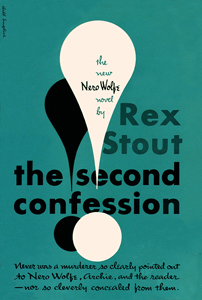Plot summary
Wealthy James U. Sperling approaches Nero Wolfe to investigate Louis Rony, an admirer of Sperling's younger daughter Gwenn. Sperling wants Wolfe to find evidence that Rony is a member of the American Communist Party. Wolfe is reluctant since he believes Rony has connections to “Z”, a shadowy criminal mastermind who has crossed Wolfe's path before in the 1948 book And Be a Villain . Nevertheless, Wolfe's assistant Archie Goodwin is dispatched undercover to Sperling's Westchester estate to see if he can discover any grounds to convince Gwenn to break off the relationship.
Present at Sperling's estate are his family, including his wife, his son and two daughters; Rony himself; Paul Emerson, a controversial conservative radio commentator who is sponsored by Sperling's corporation; and Webster Kane, an economist and friend of the family. Madeline, the eldest daughter, reveals that she is aware of Archie's true identity, having read about his exploits with Wolfe and nursed a crush on him. That night, Archie plans to drug Rony, but when he switches drinks he discovers that Rony's drink was already spiked.
The next night, Archie offers to drive Rony back to New York, but instead arranges for Wolfe's operatives, Saul Panzer and Ruth Brady, to pose as robbers and waylay them. Once Rony is knocked unconscious, Archie searches him and discovers a membership card for the Communist Party under the name of William Reynolds. Returning to New York, Archie learns from Wolfe that “Z” has given Wolfe a deadline to withdraw from the case. After the deadline passes, the greenhouse on the roof of Wolfe's house is attacked with machine-gun fire, destroying many of the orchids there.
Wolfe meets with Sperling and his family and explains that while he cannot necessarily prove that Rony is a Communist, he can prove that Rony is a member of “Z”’s criminal organisation, but it is Gwenn’s decision whether he is to proceed. That night, while everyone is awaiting it, Gwenn goes missing, prompting Archie and Madeline to search the grounds for her. Gwenn is found and reveals that she has contacted Rony and asked him to meet with her so that she can break off their relationship. Following this, Archie discovers Rony’s body; he has been hit by a car and moved into bushes away from the estate’s driveway.
When investigators arrive, evidence is found on Wolfe’s car that it was the one used to run over Rony, and therefore Archie is suspected. Then Webster Kane steps forward, claiming to have borrowed Wolfe’s car the previous night and to have accidentally run over Rony in the dark. Satisfied by Kane’s confession, the investigators prepare to rule Rony’s death an accident, but when Sperling attempts to pay Wolfe off, Wolfe becomes convinced that Kane’s confession is false and determines to discover what really happened.
Later, an anonymous package arrives at Wolfe's house, containing $50,000 cash by way of reparation from “Z”. But on his weekly radio broadcast, Emerson ridicules Wolfe and his investigation and Archie is sent to the Sperling estate to locate evidence that Rony was struck down before being run over. There Archie discovers a stone that is later proved to be the weapon. Wolfe now contacts Lon Cohen, the city editor of the Gazette, and puts a plan into action.
Over the next three days, with information provided by a secret contact, Archie drafts and submits a series of reports detailing confidential meetings of the Communist Party, which are then published in the Gazette. Wolfe subsequently meets two senior party officials and convinces them to aid him by identifying the man they know as William Reynolds, against whom Wolfe has fabricated evidence to suggest that he is the informant to the papers.
Now Wolfe gathers the suspects and pressures Webster Kane to refute his previous confession. Once he has done so, the party leaders arrive to expose Kane as William Reynolds. It emerges that Kane fabricated the earlier confession of accidental manslaughter in order to avoid being suspected of murder after Rony had discovered that he was secretly a Communist. For payment, Wolfe demands that Sperling end Paul Emerson's contract, thus forcing Emerson off the air. “Z” calls Wolfe to congratulate him on solving the case and sends another package to offset Wolfe's expenses. The money is set aside as an emergency fund to be used should they ever have to face “Z” head-on from hiding.
